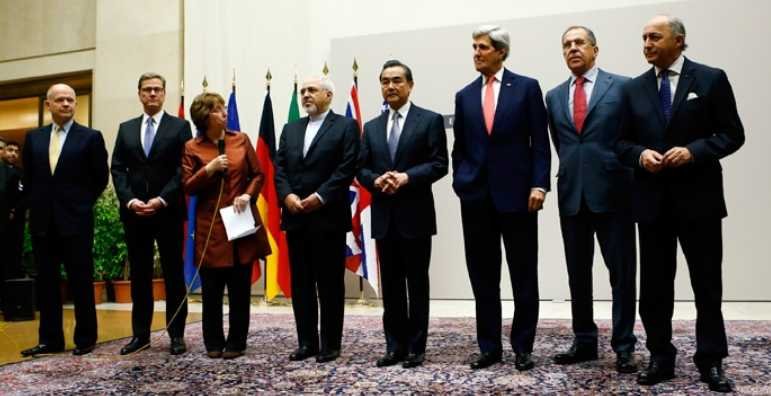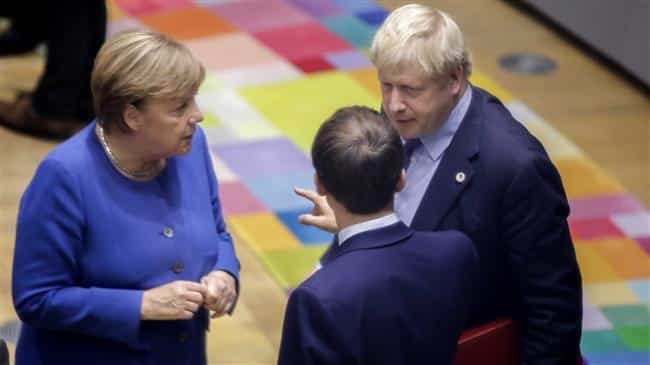
…from Press TV, Tehran
[ Editor’s Note: It comes as no surprise that the EU3 has bailed on the JCPOA and, as usual, claim they are not. So that begs the question of why put their shame on parade by making this statement now?
Boris Johnson blew any thinly veiled cover they might have had by stating that the JCPOA has to be renegotiated with a “better deal”. I would ask Boris why should the Iranians think that the US, or even the EU3 now, would honor a new agreement any more than the past one? Hey Boris, why don’t you add Israel in, so we can call you the EU3+Israel?
All they will be doing is pushing Iran, and now maybe Iraq, completely into the hands of Russia and China geopolitically. It was laid bare this week that the US views Iraq as a closet colony when it promised to freeze its $25 billion of oil income cash balance at the Federal Reserve.
We are waiting to hear from Iraq concerning how in the world they would have left all their money in the US Fed where it could be grabbed as blackmail leverage? The US has preempted them by responding that allowing Iraq to hold their own money would subject it to being taken over during a coup, so the US held it for safekeeping.
Are we to believe that, rather than having a balance statement in a US Fed account, the Iraqi “cash” was sitting in a Federal Reserve account for Iraq? If any of this is true, it would seem that Iraq surrendered its sovereignty long ago… Jim W. Dean ]
 Jim's Editor’s Notes are solely crowdfunded via PayPal
Jim's Editor’s Notes are solely crowdfunded via PayPal
Jim's work includes research, field trips, Heritage TV Legacy archiving & more. Thanks for helping. Click to donate >>

– First published … January 01, 2020 –
Britain, France, and Germany, collectively known as the EU3, have formally triggered a dispute settlement mechanism featured in a 2015 nuclear deal with Iran, a step that could lead to the restoration of UN sanctions against the Islamic Republic.
On Tuesday, the three European signatories to the Iran deal released a joint statement the mechanism was activated in response to what they claimed to be Iran’s repeated violations of the nuclear deal, officially called the Joint Comprehensive Plan of Action (JCPOA).
After the mechanism is implemented, Iran would be given 15 days to resolve the dispute with the threesome states. The process can ultimately lead to a “snapback” — which refers to the re-imposition of the UN Security Council’s sanctions that were lifted after the nuclear was reached in 2015.
The JCPOA lifted nuclear-related sanctions imposed on Iran by the UN and some other signatories of the deal, particularly the US.
The Islamic Republic, in return, voluntarily changed some aspects of its nuclear program. The agreement was later ratified in the form of Security Council 2231, which terminated previous UN resolutions against the Islamic Republic.
The United States was a partner to the accord until May 2018 when it unilaterally left the deal and re-imposed its sanctions. Washington took the move within the framework of a so-called “maximum pressure” policy against Iran that came into force under President Donald Trump.
Bowing to Washington’s pressure, the three remaining European signatories failed to protect Tehran’s business interests under the deal after the US’s withdrawal and started to tow Washington’s sanction line.
A year later, Iran began in May 2019 to gradually reduce its commitments under the JCPOA to both retaliate for Washington’s departure and prompt the European trio to respect their obligations towards Tehran.
Recently, Iran took a final step in reducing its commitments and said it would no longer observe any operational limitations on its nuclear industry. The announcement came two days after US drone strikes assassinated senior Iranian commander Lieutenant General Qassem Soleimani.
Tehran has, however, reminded that all its retaliatory steps fitted within Paragraph 36 of the JCPOA, and that its countermeasures are “reversible upon effective implementation of reciprocal obligations.”
The EU3, however, refuted “the argument that Iran is entitled to reduce compliance with the JCPOA. The trio also claimed that they meant no harm by launching the mechanism and that they were not falling into line with the US’s pressure campaign against Iran.
“[We are acting] in good faith with the overarching objective of preserving the JCPOA and in the sincere hope of finding a way forward to resolve the impasse through constructive diplomatic dialog, while preserving the agreement and remaining within its framework,” they said.
“Our three countries are not joining a campaign to implement maximum pressure against Iran. Our hope is to bring Iran back into full compliance with its commitments under the JCPOA,” they added.
The trio has already informed the European Union, which monitored the negotiations that led to the deal’s conclusion, about their decision. EU foreign policy chief Josep Borrell confirmed he has received a letter about the launch of the mechanism.
The EU now has to notify the other parties, namely Iran, Russia, and China, about the prospect. Observers, however, say the European states’ adoption of the measure belies their repeated assertions that they value the JCPOA’s continued existence and rules out the supposition that they choose to distance themselves from Washington’s hardball attitude.
Earlier on Tuesday, British Prime Minister Boris Johnson even echoed Trump’s branding of the agreement as “the worst deal ever” by saying he would be willing to work on a “Trump deal” to replace the JCPOA.
“If we are going to get rid of it then we need a replacement,” Johnson said. President Trump is a great dealmaker, by his own account. Let’s work together to replace the JCPOA and get the Trump deal instead,” he added.
Last December, the head of the Atomic Energy Organization of Iran (AEOI) had said that if the European signatories to the landmark accord activated the dispute mechanism to pressure Iran, it would mean the demise of the deal.
Tehran has also called on the European deal partners to start minding their obligations to the accord instead of walking in Washington’s footsteps by either threatening the country or trying to bring it under more pressure.

Jim W. Dean is VT Editor Emeritus. He was an active editor on VT from 2010-2022. He was involved in operations, development, and writing, plus an active schedule of TV and radio interviews. He now writes and posts periodically for VT.
ATTENTION READERS
We See The World From All Sides and Want YOU To Be Fully InformedIn fact, intentional disinformation is a disgraceful scourge in media today. So to assuage any possible errant incorrect information posted herein, we strongly encourage you to seek corroboration from other non-VT sources before forming an educated opinion.
About VT - Policies & Disclosures - Comment Policy




Part of me thinks that some close to the leadership of Iran may have helped play some part in the assassination of Soleimani, believing in as you say, “the calculation that Iranians will merely unite due to conjurings or realities of an outside threat…”.
What a pack of liars. Looks like they intended to scuttle the deal from the git-go. When did they ever adhere to the plan to circumvent sanctions?
Comments are closed.